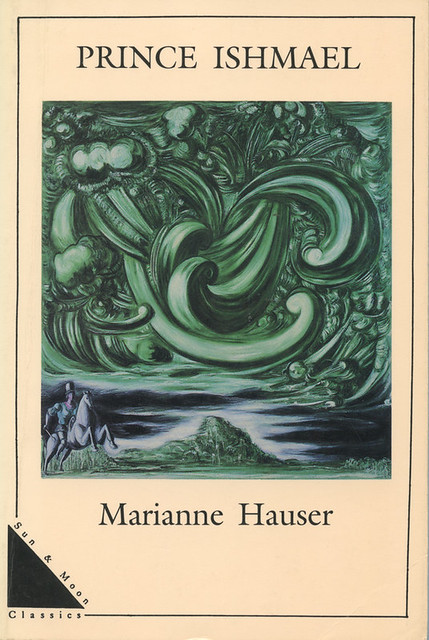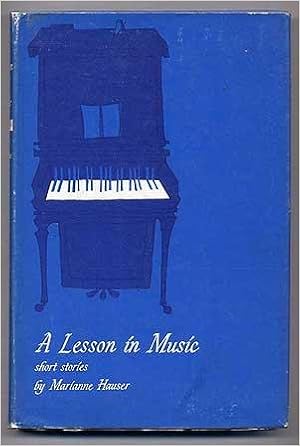Marianne Hauser, The Collected Short Fiction of Marianne Hauser. Fiction Collective 2, 2005.
Marianne Hauser's short fiction is a literary documentary of exile, the other-worldly travelogue of an imagination permanently displaced. These accounts of expatriates and lost children situate us in foreign realms, between the titillating intimacies of strangers and looming brutalities we can never quite see. In Hauser's fiction, expatriation is not a historical accident but a condition as essential to humans as breathing or speech. A young boy's suicide in "Heartlands Beat" or a child's vision of her piano teacher's corpse invoke the permanent dislocations that adulthood can never overcome. It is as though birth were, for Hauser, the great forced migration, an incomprehensible banishment from some homeland every child can remember. Her characters gaze in bewilderment at the crude and violent landscape that, through preposterous twistings, they have come to occupy, wondering how they could have ended so incongruously, unable to imagine any dwelling but here. Beautiful fabrications from the writer about whom Anais Nin remarked, "She deftly weaves the strange, the unknown, the unfamiliar, the perverse, into a fabric of human fallibilities that draws drama and farce close to us."
Marianne Hauser, Shootout with Father, FC2, 2002.
Shootout with Father is a richly textured novel built around the love-hate conflict between a father and his grown son. The story is told by the son, James, a sculptor of small objet d'art, miniature versions of the armor his father has spent a lifetime collecting. The father's ambiguities become the son's obsession and he finds himself digging deeper and deeper into his father's past in an effort to understand the man before he was a father. He discovers a student filled with romantic dreams and high hopes, a latent homosexual who, after a bizarre episode of dashed expectations, rejects his nature and builds a fortress of denial. These revelations come to light in a suspenseful, many-layered plot that is delivered with a remarkable mixture of sensitivity and biting wit. This work is vintage Hauser, an Oedipal companion piece to The Talking Room, recounting the astonishingly suicidal lengths to which the child in everyone will go to be acknowledged by his or her creator.
B? She was your idea and don't you deny it.
Hush, dearest!
Your idea, not mine, the whole sick deal.
Hush! Hush!
Go hush youself, you had it figured out to a T, planned parenthood--my aunt!--with me for mom and the test tube for pop, you really lapped that up, so sanitary, safer, you said, than some fly-by-night barfly, though anything will do. You said a little bastard is better than nothing, but make it snappy. Sweet Christ. You couldn't wait another second to play house.
You are drunk.
Just mellow, honey V, your mellow fellow. Sweet Jesus why couldn't you play in your own sand box? Why did you have to stick your finger into my mud pie?
You're getting ugly, J.
Yes, I the J and you the V. We are initials. Our names got lost in the rumpled sheets, and what, my love, my dove, will they write on our communal headstone? Two capital letters? One capital lie? Here lies the lie, the fly, initial parents of one baby B, excuse the fart. The part you forced on me--I wasn't cut out for it, don't you see? I never learned to play mother. No football coach showed me.
There...Sit by me...Please, don't have another, lie down...Stretch out...I'll rub your back...There. There now...
Rub. Moan. But it's the wind I hear. The boats moan on the river. They cry for the ocean. The voices in the talking room go dead. I've smothered them with my pillow, and maybe I invented them in any case. How would I know? It happened a long time ago, like yesterday. Those voices, I can turn them up or down like the pocket transistor I keep going under my pillow for company to beat time to my night dreams. Aunt V says it's bad for the head.
Bad for the head, she said to mom, to sleep with the radio on. Static, congressional investigations and body counts: it's unhealthy fare for an adolescent. Now if she tuned in on Vivaldi or Verdi it would be a horse of a different feather, but no, she gorges herself on the popular junk, candy, cookie & cake mix commercials when her mind should be on her diet to lose weight. Tell her to switch it off, J. You are her mother.
(Yes tell me, mother, smother me with a bear hug. Confiscate my little transistor: Smash it against the mirror. But kiss me good night.)
For crying out loud, V! Leave her alone.
Marianne Hauser, The Memoirs of the Late Mr. Ashley: An American Comedy. Sun & Moon Press, 1986.
Hauser (The Talking Room; Prince Ishmael; Dark Dominion) has written an ornate, entertaining novel about a man who looks back on his life from the grave. Drew Ashley, a sometime actor/author, has just discovered that he has died of a heart attack in a sleazy Manhattan apartment, far from the uptown home of his rich widow, Gwen (whom he now sees arguing with his mother-in-law over what they did with his ashes). Using this as a departure point, Ashley goes back over his errant life in elliptical fashion: he came from a poor family that ran a boardinghouse, and grew up dreaming of becoming an actor. He met heiress Gwen (young and extremely fat) in New England during some amateur theatricals, married her mainly for her money, and settled down to a life of rich idleness, abandoning his acting ambitions for the life of a gentleman writer, working for most of the time on a scholarly opus on southern mansions (The Glory That Was) but never finishing it, and indeed playing tapes of himself typing in case Gwen should be listening at the door. Most of his considerable energy was spent on drinking and chasing Richie, a young, Hispanic hustler he eventually moved in with, much to Gwen's dismay--it was in Richie's arms that he finally died, full of booze and unused talent, a wastrel's wastrel, but with his sense of humor (quite considerable) intact. Afterwards he can look down with a smile as Richie pretends to have some unpublished writing of Drew's, and tries to sell it to Gwen at a dollar a page. Hauser never makes full comic use of her voice-from-beyond-the-grave device (Ashley may as well be holed up on Cape Cod writing his autobiography), but she is an amusing writer and the novel, while longish in places, is diverting entertainment. - Kirkus Reviews

Marianne Hauser, Prince Ishmael. Stein and Day, 1963.
In 1828, an adolescent stranger appeared at the gates of Nuremberg; this wolf child or Ishmael could neither talk nor walk properly and claimed to have lived in a dark hole in the ground. The hole was never found, nor was it ever revealed why he had been hidden since infancy, who his enemies were and who his parents might be. Known as Caspar Hauser, he was a myth in his own time: for children, "I was their bedtime story, along with the Frog Prince. . . . I was themselves.stet For there wasn't a child, I think, who had not lived through my old past, whenever mother had slipped away with her candle to leave him trapped in that black hole of night." Celebrated and revered, jailed and finally murdered, was Caspar Hauser a fake, royalty, scapegoat or an angel sent to test mankind, "to serve as a mirror unto all hearts"? Although the prose is limpid and narrated by Caspar in the first person, the enigma remains frustratingly inscrutable. Caspar's picaresque encounters pierce human foibles and self-delusion, but the adventures flatten under lengthy exposition and Caspar's ingenuous self-infatuation. A spare style would have better served this long-out-of-print historical fairy tale by the author of Dark Dominion . - Publishers Weekly
Marianne Hauser, A Lesson in Music: Short Stories, University of Texas Press, 1964.
The collection spans from 1933 to 2005, but many of the manuscripts and drafts are undated. Edited typescripts of her short stories and novels make up the majority of the collection. Reviews and correspondence are grouped with the relative works. In addition, there are published copies of Little Buttercup and her published short stories that appeared in Harper's Bazaar and Mademoiselle. Among the unpublished works are three plays in their entirety and several short stories. Two published books have been removed from the collection and are stored with the University of Florida's Rare Books. They include Indisches Gaufelspiel by Marianne Hauser (written in German) published in 1937 and Kaspar Hauser by Herman Bies (written in German) published in 1925. The Kaspar Hauser book has been heavily annotated by Marianne Hauser in English and was signed and dated by her in 1929. Her notes reveal early ideas for her book Prince Ishmael.
Her personal correspondence mostly includes letters from other writers and is separated from her business correspondence. Hauser's unfinished works, fragments, notes, and news clippings are grouped together. Most are basic outlines of story ideas and are untitled. There are also some character sketches. The news clippings appear to be mostly for story ideas, but some were saved because they were of general interest to Hauser.
An interesting aspect of the collection is Hauser's travel photos. In the late 1930s she traveled as a journalist to North Africa, India, China, Japan, and Hawaii. Her photos and negatives, along with the articles she wrote (in German) are organized by location as much as possible. In the late 1960s she traveled to Mexico and the Yucatan, and those photos are also included.
You can read most of Larry McCaffery’s interview with Hauser (from his book Some Other Frequency) on Google Books.




No comments:
Post a Comment
Note: Only a member of this blog may post a comment.